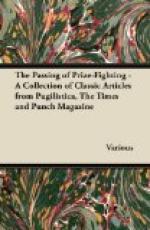UNICORN.—I have often flattered myself with that consolation.
LION.—A poor comfort: for if you are a true beast, and really have the attributes you are painted with, the greater the insult that you should be placed here. If, on the contrary, you are a lie, still greater the insult to leonine majesty, in forcing me for so many, many years to keep such bad company.
UNICORN.—But I have a great belief in my reality: besides, if the head, body, legs, tail, I bear, never really met in one animal, they all exist in several: hence, if I am not true altogether, I am true in parts; and what would you have of a thick-and-thin supporter of the crown?
LION.—Blush, brother, blush; such sophistry is only worthy of the Common Pleas, where I know you picked it up. To be sure, if both of us were the most abandoned of beasts, we surely should have some excuse for our wickedness in the profligate company we are obliged to keep.
UNICORN.—Well, well, don’t weep. Take the pot.
LION.—Have we not been, ay, for hundreds
of years, in both Houses of
Parliament?
UNICORN.—It can’t be denied.
LION—And there, what have we not seen—what have we not heard! What brazen, unblushing faces! What cringing, and bowing, and fawning! What scoundrel smiles, what ruffian frowns! what polished lying! What hypocrisy of patriotism! What philippics, levelled in the very name of liberty, against her sacred self! What orations on the benefit of starvation—on the comeliness of rags! Have we not heard selfishness speaking with a syren voice? Have we not seen the haggard face of state-craft rouged up into a look of pleasantness and innocence? Have we not, night after night, seen the national Jonathan Wilds meet to plan a robbery, and—the purse taken—have they not rolled in their carriages home, with their fingers smelling of the people’s pockets?
UNICORN.—It’s true—true as an Act of Parliament.
LION.—Then are we not obliged to be in the Courts of Law? In Chancery—to see the golden wheat of the honest man locked in the granaries of equity—granaries where deepest rats do most abound—whilst the slow fire of famine shall eat the vitals of the despoiled; and it may be the man of rightful thousands shall be carried to churchyard clay in parish deals? Then in the Bench, in the Pleas—there we are too. And there, see we not justice weighing cobwebs against truth, making too often truth herself kick the beam?




